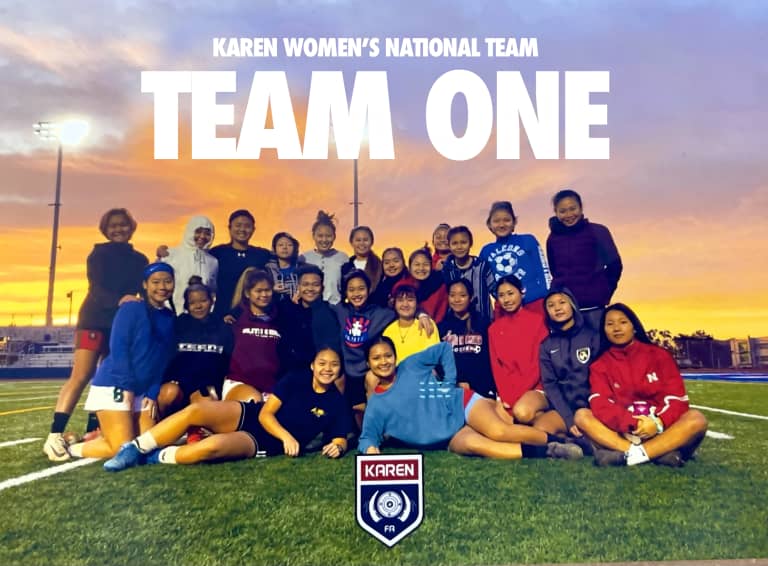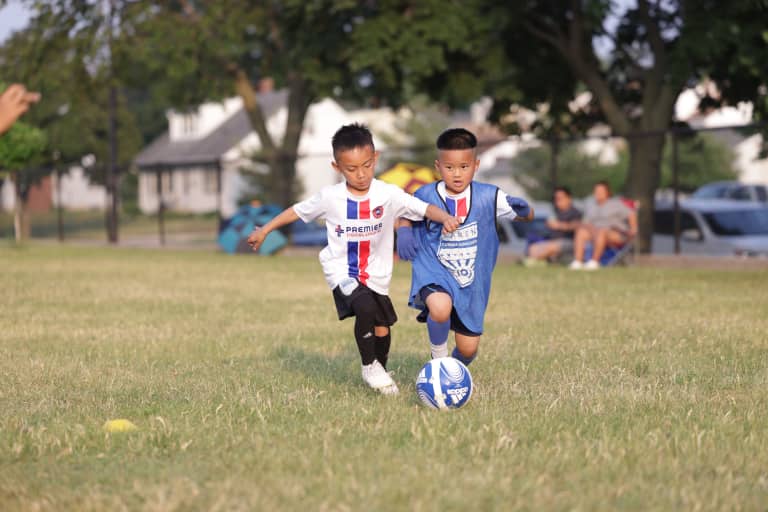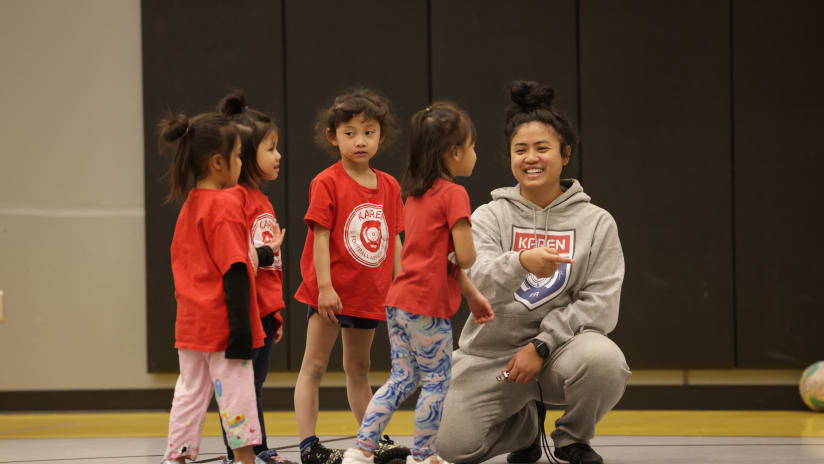Thousands of soccer teams dot the landscape across the United States nowadays, creating a unique network to spread the reach of the beautiful game. These organizations range from professional MLS sides all the way to recreational weekend leagues for children and everything in between. Regardless of the level, one key component remains the same: these entities all work together to build the future of our sport and enrich the lives of those who play it.
Amongst all of those organizations, though, there’s nothing quite like Karen FA (pronounced kuh-ren). MNUFC and Blue Cross Blue Shield have partnered with KFA for community soccer clinics for three years running, as well as in other initiatives to help them continue writing their unique story. Since 2019, Karen FA has championed more than a sport; they’ve rallied a community and begun to make gender equality a reality.
What exactly is Karen FA? Essentially, it acts like the United States Soccer Federation for the global Karen community, allowing them to represent their people in CONIFA-sanctioned games. The Confederation of Independent Football Associations, or CONIFA for short, is the governing body for teams not affiliated with FIFA. They give sub-national entities, stateless peoples, and ethnic minorities the chance to play international football, giving displaced and underrepresented people a chance to represent their community on a bigger stage.
The work of Karen FA since their founding has been unique and inspiring. Starting a national team for a displaced community was never going to be an easy task, but it was always going to be worthwhile. To truly understand the task ahead of the young association, we must first understand the history of the Karen community.
Starting with Perspective
For centuries, the Karen people inhabited the Eastern hills of what is now Burma. Several other people groups settled nearby, putting down roots with cultures of their own. When the British colonized the area in 1886, these groups were forced to become part of the same nation, giving birth to Burma.
When Burma became independent in 1948, the Karen people weren’t granted rights to their land. Most of the Karen people have been forcibly removed from their homes and forced to watch as their villages were destroyed and loved ones were killed. To escape further violence, many have relocated to refugee camps on the border of Thailand, where they seek resettlement in a new country.
Though the civil war rages on in their homeland, the resilient Karen people are finding new homes around the world. They’re spread out across the globe, from Australia to Norway and even several places around the United States.
Karen FA: Beginnings and Mission
While the total population of Karen is difficult to measure, it is estimated that there are 6 million members of the community across the globe. The bulk of the population remains in Burma, while pockets of refugees and immigrants can be found in various places around the world.
The largest Karen population outside of Burma can be found in Thailand, with approximately 1,000,000 people. The United States is home to more than 200,000, Australia has more than 10,000, and Canada, India, Sweden, and Norway all have small populations as well.
With the community spread so thin, a national soccer team likely seemed like an impossible dream to many, if they had ever considered it at all. Luckily, the 17,000-strong Karen community in Minnesota has plenty of dreamers.
Kyle Johnson, founder and executive director of Karen FA, was introduced to the Karen community through soccer. When his son attended Como Park High School and played in the St. Paul City Conference, Johnson noticed how talented the teams from Como, Washington, and Humboldt were. Many of the athletes on these teams were from the Karen and Karenni communities. After attending the state tournament banquet with his son, Johnson noticed something else as well.
“I noticed that, on the boys side, teams were becoming more diverse,” Johnson said. “You would see teams that would have more diversity, largely because many refugees and immigrant families would move to cities like Austin, Faribault, and Worthington for more job opportunities. But what really stuck out to me was that on the girls side, there was virtually no diversity at all. The top eight teams in the state were all from very affluent communities and private schools, and there was really no diversity at all in the girls. I knew from Como Park that there were some incredible athletes who deserved to be up on that stage; they just weren't really being given a great opportunity. So I wanted to just give the girls at Como Park more opportunities.”
So he did just that, opening up gym space, organizing times for the girls to play organized games, and more. As fate would have it, the women’s coaching position at Como Park came open the very next season, a role that Johnson would happily fill.
Through his soccer connections, Coach Johnson became aware of the Tibet Women’s National Team. This was the first time he was introduced to CONIFA, and sparked the idea to apply for a team to represent the Karen people. Having watched and coached much of the talent in the Karen community, Johnson reached out to CONIFA to inquire about becoming a member. After a brief back and forth, the Karen Football Association was formed.
What began with a desire to bring diversity to the girls’ game in Minnesota had officially become something even bigger. With a chance to effect serious, far-reaching change, Karen FA became a beacon of hope for a community that deserves more than a little good in their lives.

Making the Vision Real
Once the organization was legitimized by CONIFA, the excitement and sense of purpose began to grow. For the first time ever, the Karen people had a team of their own.
With this new platform, the people behind Karen FA knew that they were dealing with more than just soccer. They have committed to promoting gender equity through sports, using their athletes as role models, and striving to change the way sports are talked about between genders while inspiring the next generation of Karen soccer players.
Prior to the pandemic, KFA was able to host a few camps, fittingly kicking things off with their first-ever women’s national team camp in San Diego, followed shortly by the first men’s national team camp.
“It was our intention to host the women’s camp first,” Johnson said. “With our mission of gender equity, it was important that we started with this camp. We adopted a phrase from Carrie Taylor, one of the guest coaches we had at the camp in San Diego, ‘Team One’”
Taylor was a pioneer for many women in soccer. Most recently, she was the first and only women’s professional soccer coach in the US, coaching alongside Landon Donovan with the San Diego Loyal. She ran one of Karen FA’s practices while they were on the West Coast, speaking to the athletes about what it meant to be on Team One.
Ever since COVID changed the landscape of the world we live in, some of the momentum of the national teams has died down a bit. However, the mission of KFA remains the same, and much like the Karen people, the organization has learned to adapt.
With national team activities harder to organize, the KFA Youth Academy and NXTGEN programs were formed. These initiatives aim to help teach the next generation of athletes by giving them a structured, professional environment for ages five to 11 to train in.
“Every time I would ask one of the athletes, ‘What would you like to get from being on the national team?’ Two answers always came up,” Johnson said. “The first was, we want the world to know who the Karen people are. We want our community to know who the Karen people are. Number two was that they want to give the next generation of kids opportunities they never had. More organized soccer, really focusing on a younger generation. We are hoping that by creating this academy, we are acting on those wishes and providing more opportunities for kids in the future.”
With about 80 kids currently participating in the KFA Youth Academy, the mission is off to a fast start.
KFA has always been an organization of the community, with so many wonderful people helping make it what it has become. Since day one, KFA Secretary and Board Member Lay Lay Zan has been an integral part of the organization’s journey.
“We've come a long way,” Zan said. “The pandemic sort of halted the national team; there was a lot of excitement built for actual competition against other nations. And I don't know what the future of that is. But, as a community, we were excited to be selected to go play. I'm an athlete as well. I wear a lot of hats with KFA, and it's been great. The mission is part of my core. It's something that I've experienced as a female athlete in the community. I can see there's a different energy towards men’s soccer and women’s soccer, and so we're trying to work really hard to build and maintain the soccer culture for the women's side. Of course, life gets in the way; we're getting into our careers, some are even starting families. That's a challenge with trying to see women playing at a higher level. I know right now, we have a few athletes who are playing in the UPSL, and that's big. Some people may not understand it, but that's a really high level. And college is a high level as well as to see athletes pay for college is great. Eventually, we want to see a professional Karen player out there, so we’re just trying to maintain that soccer culture and support women and girls that play the sport.”

More to Come
The story of Karen FA is still getting started. For a community so resilient and strong, a pandemic was never going to stop their soccer dreams from becoming reality. In the coming months and years, the organization will be building on the foundation they’ve already laid, bringing opportunity and connection to the Karen community unlike ever before.
This very summer, KFA will be hosting their first-ever women’s showcase tournament at McMurray Fields on July 29 and 30. This event will give female players a chance to show their talent, with a focus on communities that wouldn’t normally receive these kinds of chances.
On the men’s side, there will be an ID camp at Como Park High School from June 16 to June 18. Like the showcase, this event will give players a chance to show that they’re talented and capable, providing a platform from which the Karen community can continue to develop their soccer culture.
On top of the youth initiatives that have taken shape in the last year, KFA is also planning to rekindle their national team efforts in the near future. Before too long, the youth in the academy will once again have a senior team to shoot towards.
We are all inspired by something. We see ourselves in our childhood heroes, hoping to one day become just like them. For the youth of the Karen community, there have always been heroes to look up to: parents who secured safer lives in new countries; grandparents who fought bravely to protect their families from unjust circumstances; loved ones who suffered and sacrificed so much so that the next generation can have something better.
For the first time in their history, Karen children have a place to look to for inspiration, opportunity, and a platform to become professional soccer players in real, tangible ways. There is undeniable talent in this community. Even greater than that, though, there is perseverance, there is kindness, and there is the burgeoning story of Karen FA.




